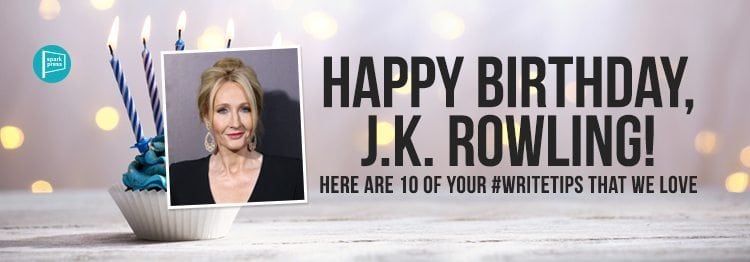
We all love to soak up sage advice from our favorite successful authors—and what better way to share the literary love than during a birthday week? Three birthdays, to be exact. Not only are we celebrating the big birthday #8 for BookSparks and birthday #4 for SparkPress—but it’s J.K. Rowling’s birthday this week too. And when it comes to the writing and publishing process, you can trust that here at Sparkpress we only want to share the best—and most important—tips from an especially qualified author like J.K. Rowling.
On her journey, Rowling has encountered ups and downs, from being a single mother and overcoming depression, countless rejections and, well, you know. The movies and all that jazz. But it’s important to remember where you came from, no matter how big of a best-selling author you are. Throughout dozens of interviews in her career, we’ve helped compile some of the most important lessons she’s learned.
-
Guard your writing time like gooollld.
If you don’t make time for your writing, nothing will ever get done. Figure out a writing schedule and environment that works for you, and keep it set in stone as much as possible. A half hour every Sunday afternoon? Two thousand words first thing each morning? Whatever it is, write it into your schedule as if it was a doctor’s appointment or gym class. Rowling has recounted how she wrote on the subway and in coffee shops, taking advantage of even a few spare moments during the day.
-
Start with a rough outline.
Planning is crucial when it comes to creating a book. Sure, there’s the old adage that “writing a novel is like driving a car at night: you can only see as far as your headlights.” But it would be devastating to dive into writing a book with no plan—especially when writing a series, and in the fantasy genre at that. Rowling plotted and planned the major events of each of the seven books before she began writing book one.
-
Write what you know or love.
You have to write on and about your own interests, beliefs, experiences, and fantasies. That might sound like a give-in, but the second you start trying to write what you think the market wants, or what the next hot trend might be (“vampires are out—what about mermaids?!”) you’ll get sucked into a rabbit hole of stress.
-
Or write for just one person.
Write what you would want to read, as if creating the perfect book for the reader you know best: yourself. Or focus on one person that you know is a qualified reader—think your best friend, mother, creative writing professor, son, or daughter—and write the book for them. Keep a neutral perspective, though: writing for the owner of your local Barnes and Noble will draw you back into the “writing for the masses” trigger.
-
Write, rewrite . . . then rewrite some more.
Re-writing is as essential as, well, writing. Rowling wrote the first Harry Potter chapter ever over 15 times before it felt right to her. Focus on getting the story down, then re-focus on separate elements and how they fit together: the plot, character dynamic, setting, dialogue, and so forth.
-
Working on multiple books? No worries!
As an author, you may think focusing on just one book at a time is key. While some authors work best this way, others excel when juggling multiple projects—you can put one aside when you’re stuck and work on the next, or turn a book into a series. Rowling has been known to work on two or three books at once. Maybe it will fuel your creativity, or maybe if it ends up being a distraction, you’ll garner motivation to get one done and move on to the next!
-
To kill or not to kill: your darlings or adverbs?
“Kill your darlings” is such as well-known term in writing it requires no explanation. But this truth should also be applied to a possible killing spree on adverbs. All those “ly” words can really add up, and there are some writing coaches who attest that you should never use an adverb until you’ve mastered writing without them. This comes back to the “show, don’t tell” advice: instead of saying that your character sat down quickly, detail the thump of the cushion as he fell into his seat.
-
Decide how you want to publish.
While we’ve advised not to write “for” the industry, you do need to consider what a publisher would want to publish. Rowling encountered tons of rejection, and you might too. First, try to secure an agent who will act on your behalf (Writer’s Market has a great list of agents and publishers that’s updated annually). And always make sure you’re contacting the correct people for your genre. When it comes to publishing nowadays, you may have your heart set on traditional publishing—but also consider hybrid publishers as a fast-evolving and growing middle ground, and self-publishing, as a last resort. Know your industry.
9. Follow instructions.
It goes without saying to look up and follow the guidelines when you’re submitting to an agent or publisher—but you’d be surprised how many people don’t follow instructions. Doing so, and being professional, can truly make you stand out. Take workshops for crafting book pitches or writing query letters. It’s important to invest in the business side of your art, just like anything else.
10. Finish it anyway.
Recently J.K. Rowling wrote something on her Twitter account. She said that she wished someone had told her this when she first started out: HEY! YOU! You’re working on something and you’re thinking “Nobody’s gonna watch, read, listen.” Finish it anyway.

Leave A Comment